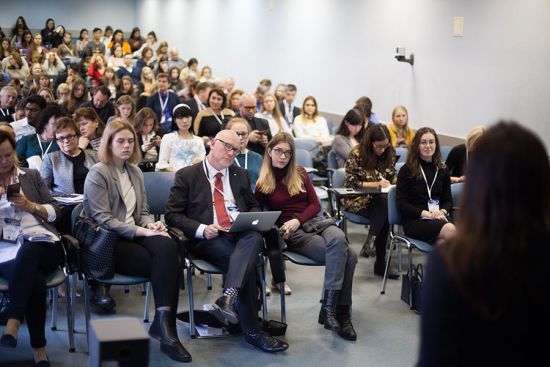The world of communications: a hundred years after Orwell’s 1984
December 05, 2018
 St Petersburg University has hosted the 6th international conference «Strategic Communications in Business and Politics» (Stratcom-2018).
St Petersburg University has hosted the 6th international conference «Strategic Communications in Business and Politics» (Stratcom-2018).
Academics and media practitioners deliberated on: changes in political and cultural communication; why trust has been lost in the media; what happened to «Guttenberg’s Galaxy»; and what awaits the media in the year 2084.
The State in the new strategic communications reference frame
Moderated by Professor Dmitry Gavra and Professor Vera Achkasova, the plenary session focused on strategic communications, communication strategies, and the devaluation of trust.
Professor Herman Wasserman, Director of the Centre for the Study of Cinema and Media at the University of Cape Town (South Africa), shared his studies of the channels of political communication in two African countries: South Africa and Zimbabwe. Despite all the differences in terms of governance and social structure, people in both countries are increasing their use of informal channels of communication outside the traditional media to talk about politics. So, the language of political communication includes pop music, dance, street theatre, and graffiti. According to Professor Wasserman, in Africa, the link between the democratization process and media freedom is far from obvious.
The Head of Conservation and Cultural Heritage Research at Peterhof State Museum, Anna Lyashko presented the paper «The museum as a driver of national ideology: 100 years of the museum life of Peterhof State Museum-Reserve.» Anna Lyashko said that historically, museums were opened for political rather than aesthetic reasons. For example, the summer residence of Peter the Great was turned into a museum to perpetuate the memory of the emperor. In the post-war years, the restoration of destroyed palaces, fountains and Peterhof Park became a symbol of the revival of the Soviet Union after World War 2. The Peterhof State Museum — one of most visited museums of Russia — has a strategically important task to export Russian culture.
Associate Professor of St Petersburg University Konstantin Pantserev touched upon ensuring national information security in the era of global information and psychological confrontation. He pointed out that foreign policy confrontation is moving from traditional media to social networks, an irreversible process which is difficult to control.
Stratcom is an annual conference that has been held at St Petersburg University since 2013. Its mission is: to establish a dialogue between Russian and foreign academics and practitioners in such fields as strategic communications, public relations, advertising, government relations, and territorial marketing; and to boost the development of communication studies in Russia through strengthening research collaboration both within Russia and internationally. Participants from Russia, China, Poland, South Africa and other countries took part in the two-day conference, which included ten plenary and round table discussions. Conference papers are published in the conference proceedings «Strategic Communications in Business and Politics».
Memories of the future
St Petersburg University Professor Dmitry Gavra attempted to make a forecast as to what the world of communication will look like in 2084. He believes that we are moving to a society that will have a new economic dimension — communication capitalism.
This new social stratification will derive from who owns information and technological leverage.
On the other hand, IT developments will soon lead to the emergence of equal relations between man and machine, with the latter acquiring the status of a subject. Business and interpersonal communication will be supplanted by interaction with bots, while the opportunity to communicate with a human consultant will become the prerogative of elites. Thus, digital labour will supplant human labour, work will become a privilege, and consumption will take the form of working, spiritual practices or playing. Dmitry Gavra also offered his own vision of what will be the place of a PR or marketing specialist in such a future: they will serve as consultants in strategic communications, or perhaps, practice the new professions of communicative animators or therapists.
Yuri Zinchuk, Deputy General Director of the St Petersburg TV Channel, presented a paper on the future of television journalism. The Internet is destroying its classical genres by changing the audience. It is increasingly difficult for television to resist these changes. Despite attempts to adapt to global transformations, television will be completely supplanted by the Internet, said Yuri Zinchuk.
Yuri Strofilov, the owner of the media resource Saint-Petersburg. ru and founder Spbnews PR-agency, discussed the decline of «Guttenberg’s galaxy». He believes that we do not have enough time to process all the data because we are faced with a huge amount of information. As a consequence, we will increasingly be forced to make decisions in conditions of high uncertainty. This is a big challenge for those who are inclined to rational, logical thinking. Yuri Strofilov suggested that the media and PR agencies will perform the same functions associated with personalising content and spreading it in narrow segments. He said that we think we are choosing from the most appropriate options for us, but it means essentially a lack of choice, the creation of an information vacuum.
Professor of Plekhanov Russian University of Economics Marina Shilina presented a paper entitled «Destruction of trust: global and national strategic communication in the digital economy and data fight society.» It discussed core ideas of the federal programme «Digital Economy of the Russian Federation. » The conference also included a presentation of a new dictionary that has been prepared under the guidance of St Petersburg University Professor, Liliya Duskayeva. The title is «Media linguistics in terms and concepts: an annotated dictionary», and it is the first Russian language reference book that explains the concept of strategic communication.
No comments yet. Be the first!


